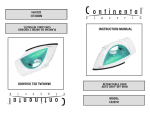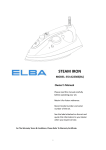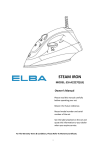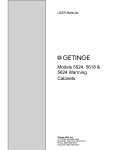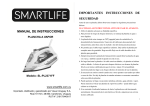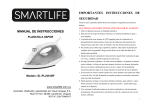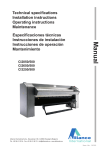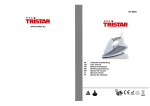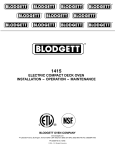Download Continental METALLIC CM43095 User's Manual
Transcript
MODEL: CM43095 Retractable Cord Auto Shut-Off Iron INSTRUCTION MANUAL MANUAL DEL USUARIO Plancha de Vapor y Rociado con Cable Retractable MODELO: CM43095 SAVE THESE INSTRUCTIONS 1. To avoid a circuit overload, do not operate another high wattage appliance on the same circuit. 2. If an extension cord is absolutely necessary, a 10-ampere cord should be used. Cords rated for less amperage may overheat. Care should be taken to arrange the cord so that it cannot be pulled or tripped over. DO NOT let children or untrained persons use the appliance without supervision. NEVER immerse the iron, cable or plug in any liquid. DO NOT leave the hot iron touching fabrics or very inflammable surfaces. DO NOT leave the appliance unnecessarily plugged in. Disconnect the plug from the mains when the appliance is not being used. NEVER touch the appliance with wet or damp hands. DO NOT use the power cord or the appliance in order to pull the plug out of the socket. DO NOT leave the appliance exposed to the weather (rain, sun, etc. ). DO NOT leave the iron without supervision when it is connected to the power supply. DO NOT fill the reservoir with water before removing the plug from the socket. PLEASE NOTE! Do not use chemical additive, scented substances or decalcifiers. Failure to comply with the above-mentioned regulations leads to the loss of guarantee. SPECIAL INSTRUCTIONS When using your flat iron, basic safety precautions should always be followed, including the following: READ ALL INSTRUCTIONS BEFORE USING 1. Use iron only for Its intended use. 2. To protect against a risk of electric shock, do not immerse the iron in water or other liquids. 3. The iron should always be turned to “Min” before plugging or unplugging from outlet. Never yank cord to disconnect from outlet; instead, grasp plug and pull to disconnect. 4. Do not allow cord to touch hot surfaces. Let iron cool completely before putting away. Loop cord loosely around iron when storing. 5. Always disconnect iron from electrical outlet when filling with water or emptying and when not in use. 6. Do not operate iron with a damaged cord or if the iron has been dropped or damaged. To avoid the risk of electric shock, do not disassemble the iron take it to a qualified serviceman for examination and repair. Incorrect reassembly can cause a risk of electric shock when the iron is used. 7. Close supervision is necessary for any appliance being used by or near children. Do not leave iron unattended while connected or on an ironing board. 8. Burns can occur from touching hot metal parts, hot water, or steam. Use caution when you turn a steam iron upside down – there may be hot water in the reservoir. 9. If the malfunction indicator goes on, the flatiron is not operating normally. Disconnect from the power supply and have the flatiron serviced by qualified service personnel. 10. The iron must be used and rested on a stable surface. 11.When placing the iron on its stand, ensure that the surface on which the stand is placed is stable. 12.The iron is not to be used if it has been dropped, if there are visible signs of damage or if it is leaking. IMPORTANT SAFEGUARDS INSTRUCCIONES DE SEGURIDAD Al momento de utilizar su plancha plana, debe seguir las precauciones de seguridad que incluyen lo siguiente: LEA TODAS LAS INSTRUCCIONES ANTES DE USAR 1.Utilice la plancha solo para los fines que fue diseñada. 2.Con el fin de evitar una descarga eléctrica, no sumerja la plancha en agua u otros líquidos. 3.Debe siempre colocarse la plancha en el nivel “Min” (mínimo) antes de enchufarla o desenchufarla. Nunca tire del cordón para desconectarla del tomacorriente, sino que más bien tire del enchufe mismo. 4.No permita que el cordón entre en contacto con superficies calientes. Deje enfriar la plancha completamente antes de guardarla. Enrolle el cordón sin ajustar mucho alrededor de la plancha. 5.Siempre desenchufe la plancha al momento de llenarla con agua o de vaciarla y cuando no la este usando. 6.No utilice la plancha si tiene el cordón dañado o si la plancha ha sufrido una caída o un desperfecto. Con el fin de evitar una descarga eléctrica, no desarme la plancha sino que llévela a un técnico calificado para que la examine o repare. Si se la arma incorrectamente, puede producirse una descarga eléctrica al momento de usar la plancha. 7.Si un electrodoméstico va a ser utilizado por un niño o en su presencia, debe supervisársele constantemente. No deje la plancha desatendida mientras se encuentre conectada o encima de un planchador. 8.Se puede producir quemaduras si se toca las partes calientes de metal, el agua caliente o el vapor. Tenga cuidado al voltear la plancha de cabeza ya que puede haber agua caliente en el tanque. 9.Si se enciende la luz indicadora de desperfectos, la plancha no esta funcionando normalmente. Desenchúfela y hágala arreglar por parte del servicio técnico calificado. 10.Debe usarse la plancha sobre una superficie estable. 11.Al momento de colocar la plancha sobre su soporte, asegúrese de que la superficie donde se ha colocado el soporte sea estable. 12.No utilice la plancha si ésta ha sufrido una caída, si hay señales visibles de daños o si presenta una fuga o gotera. INSTRUCCIONES ESPECIALES 1.Con el fin de evitar la sobrecarga de un circuito, no conecte otro electrodoméstico de alto consumo de voltaje al mismo circuito. 2.Si fuera absolutamente necesario usar una extensión, debe usarse un cordón de 10 amperios. Los cordones de menos amperaje pueden sobrecalentarse. Debe tenerse cuidado al acomodar el cordón para que sea tirado pro alguien o que alguien se tropiece. NO permita que los niños o que las personas no capacitadas usen el electrodoméstico sin supervisión. NUNCA sumerja la plancha, el cordón ni el enchufe en ningún tipo de líquido. NO deje la plancha caliente en contacto con telas o superficies muy inflamables. NO deje la plancha enchufada si no es necesario. Desenchúfela si no la va a utilizar. NUNCA toque el electrodoméstico con las manos mojadas o húmedas. NO utilice el cordón ni el electrodoméstico para desenchufarlo del tomacorriente. NO deje el electrodoméstico expuesto a la intemperie (la lluvia, el sol, etc.) NO deja la plancha sin supervisión mientras se encuentre conectada. NO llene el tanque con agua sin antes haber desenchufado la plancha. ¡ATENCIÓN! No utilice aditivos químicos, sustancias perfumadas ni para descalcificar. Si no se cumple con estas indicaciones, se puede perder la cobertura de la garantía. GUARDE ESTAS INSTRUCCIONES DESCRIPCIÓN DEL APARATO (1) Rociador (2) Alimentador (3) Perilla de vapor (4) Botón rociador (5) Botón de chorro de vapor (6) Plataforma con agujeros para vapor (7) Enchufe (8) Cordón (9) Luz indicadora de temperatura (10) Tanque de agua transparente (11) Perilla del termostato para regular la temperatura (12) Nivel máximo de llenado (13) Parte posterior (14) Medidor de agua (15) Base (16) Cubierta del mango (1). Spray (2). Filler (3). Steam dial (4). Spray button (5). Shot-steam button (6). Plate with steam vents (7). Cord bushing (8). Power supply cord (9). Plate temperature control light (10). Transparent water tank (11). Thermostat knob for temperature regulation (12) Maximum filling level (13). Rear (14). Water measure (15). Skirt (16). Handle cover DESCRIPTION OF DEVICE - Check that the plug is disconnected from the socket. - Move the steam selector (3) to “0” [Fig. 1]. - Open the lid (2). - Raise the tip of the iron to help the water enter the opening without overflowing. - Slowly pour the water into the reservoir using the special measure (14) and taking care not to go over the maximum level (about 300ml) indicated by “MAX” on the reservoir [Fig. 2]. - Close the lid (2). Filling the reservoir STEAM IRONING Start ironing the garments requiring a low temperature. This reduces the waiting times (the iron takes less time to heat up than to cool down) and eliminates the risk of scorching the fabric. Fabric not to be ironed GARMENT LABEL FABRIC TYPE • synthetic low temperature •• silk - wool medium temperature ••• Cotton - linen high temperature THERMOSTAT REGULATION INSTRUCCIONES GENERALES Al momento de usar la plancha por primera vez, puede ser que se note una ligera emisión de humo y que se oiga algunos sonidos producidos por la expansión del plástico. Esto es normal y se detendrá después de un rato. Recomendamos pasar la plancha por encima de una tela simple antes de usarla por primera vez. PREPARACIÓN Separe la ropa que se va a planchar de acuerdo a los símbolos internacionales que vienen en las etiquetas de las prendas, o de lo contrario, de acuerdo al tipo de tela. Etiqueta de la Prenda Tipo de Tela algodón – lino ••• seda – lana •• sintética • Regulación del Termostato temperatura baja temperatura media temperatura alta tela que no debe plancharse Comience a planchar las prendas que requieran de temperatura baja. Esto reduce el tiempo de espera (la plancha tomas menos tiempo para calentarse que para enfriarse) y elimina el riesgo de quemar la tela. PLANCHADO A VAPOR Cómo llenar el tanque de agua -Verifique que el tapón no se encuentre en la abertura del alimentador. -Mueva el selector de vapor (3) a 0º [Fig. 1]. -Abra la tapa (2) -Levante la punta de la plancha para ayudar a que el agua ingrese por la abertura sin que se reblase. -Lentamente vierta el agua dentro del tanque utilizando el medidor especial (14) y cuidando de no sobrepasar el nivel máximo (unos 300mm) que se indica con la marca “MAX” en el tanque [Fig. 2] -Cierre la tapa. Soft the laundry to be ironed according to the international symbols on the garment label, or if this is missing, according to the type of fabric. PREPARATIONS When using the iron for the first time, you may notice a slight emission of smoke and hear some sounds made by the expanding plastics. This is quite normal and it stops after a short time. We also recommend passing the iron over an ordinary cloth before using it for the first time. GENERAL INSTRUCTIONS Cómo seleccionar la temperatura -Coloque la plancha en posición vertical. -Coloque el tapón en la abertura. -Regule el termostato (11) de acuerdo al símbolo internacional en la etiqueta de la prenda [Fig. 3]. La luz indicadora de temperatura (9) indica que la plancha se está calentando. Espere hasta que luz indicadora se apague para comenzar a planchar. Advertencia: Durante el planchado, la luz indicadora de temperatura (9) se enciende en intervalos, indicando que la temperatura seleccionada se encuentra manteniéndose. Si se baja la temperatura después de planchar a temperatura alta, no planche hasta que la luz indicadora de temperatura se encienda de nuevo. Cómo seleccionar el vapor La cantidad de vapor se regula por medio del selector de vapor (3). - Mueva el selector de vapor a la posición entre el mínimo y el máximo dependiendo de la cantidad de vapor requerido y la temperatura seleccionada [Fig. 1]. Advertencia: La plancha produce vapor continuamente solo si se sostiene la plancha de manera horizontal. Se puede detener el vapor colocando la plancha de manera vertical o moviendo el selector de vapor a “0”. Como se indica en el termostato 811) y en el cuadro inicial, solo se puede usar el vapor a temperaturas altas. Si la temperatura es demasiado baja, el agua puede empezar a gotear de la plataforma. Cómo seleccionar el planchado con chorro de vapor al planchar verticalmente Presione el botón para lanzar el chorro de vapor (5) para generar una potente emisión de vapor que pueda penetrar en la tela y suavizar las arrugas más difíciles y profundas. Espere unos segundos antes de presionar de nuevo [Fig. 4]. PLANCHADO AL SECO Para planchar sin vapor, siga las instrucciones en al sección “Planchado con vapor” dejando el selector de vapor (3) en la posición “0”. LIMPIEZA Nota: Antes de proceder a limpiar la plancha de cualquier forma, asegúrese de que no se encuentre enchufada. Cualquier tipo de depósitos, residuos de almidón o suciedad que se acumule en la plataforma se puede remover utilizando un paño húmedo o un líquido detergente no abrasivo. Evite arañar la plataforma con una esponja de metal o con objetos metálicos. Las partes plásticas se pueden limpiar con un paño húmedo y secar con otro paño. Cordón retráctil •Este producto viene equipado con un cordón retráctil. Presione el botón para retraer el cordón para proceder a enrollarlo y guardarlo. Si el cordón no se retrae totalmente, sáquelo de nuevo y vuelva a presionar el botón [Fig. 7]. • The product is equipped with a retractable cord. Press the cord rewind button to engage cord storage. If the cord does not fully retract, pull it out again and then press on the cord rewind button. [Fig. 7] Cord retractor Please note: before cleaning the iron in any way, make sure that the appliance plug is not connected to the socket. Any deposits, starch residue or size left on the plate can be removed using a damp cloth or an unabrasive liquid detergent. Avoid scratching the plate with steel wool or metallic objects. The plastic parts can be cleaned with a damp cloth then wiped over with a dry cloth. CLEANING To iron without steam, follow the instructions in section “steam ironing”, leaving the steam selector (3) on position “0”. DRY IRONING Press the shot-steam button (5) to generate a powerful burst of steam that can penetrate the fabrics and smooth the most difficult and tough creases. Wait for a few seconds before pressing again [Fig. 4]. Selecting Shot-steam and steam when ironing vertically. The quantity of steam is regulated by the steam selector (3). - Move the steam selector to a position between minimum and maximum depending on the quantity of steam required and the temperature selected [Fig. 1]. Warning: the iron gives off steam continuously only if you hold the iron horizontally. You can stop the continuous steam by placing the iron in a vertical position or by moving the steam selector to “0”. As indicated on the thermostat knob (11) and in the initial table, you can only use steam at the highest temperatures. If the selected temperature is too low, water may drip onto the plate. Selecting the steam. - Put the iron in a vertical position. - Put the plug in the socket. - Adjust the thermostat knob (11) according to the international symbol on the garment label [Fig. 3]. The plate temperature control light (9) indicates that the iron is heating up. Wait until the plate temperature control light goes off before ironing. Warning: during ironing, the plate temperature control light (9) comes on at intervals, indicating that the selected temperature is maintained. If you lower the thermostat temperature after ironing at a high temperature, do not start ironing until the plate temperature control light comes on again. Selecting the temperature. MODEL: CM43095 MANUAL DEL USUARIO Plancha de Vapor y Rociado con Cable Retractable MODELO: CM43095 Retractable Cord Auto Shut-Off Iron INSTRUCTION MANUAL INSTRUCCIONES DE SEGURIDAD Al momento de utilizar su plancha plana, debe seguir las precauciones de seguridad que incluyen lo siguiente: LEA TODAS LAS INSTRUCCIONES ANTES DE USAR 1.Utilice la plancha solo para los fines que fue diseñada. 2.Con el fin de evitar una descarga eléctrica, no sumerja la plancha en agua u otros líquidos. 3.Debe siempre colocarse la plancha en el nivel “Min” (mínimo) antes de enchufarla o desenchufarla. Nunca tire del cordón para desconectarla del tomacorriente, sino que más bien tire del enchufe mismo. 4.No permita que el cordón entre en contacto con superficies calientes. Deje enfriar la plancha completamente antes de guardarla. Enrolle el cordón sin ajustar mucho alrededor de la plancha. 5.Siempre desenchufe la plancha al momento de llenarla con agua o de vaciarla y cuando no la este usando. 6.No utilice la plancha si tiene el cordón dañado o si la plancha ha sufrido una caída o un desperfecto. Con el fin de evitar una descarga eléctrica, no desarme la plancha sino que llévela a un técnico calificado para que la examine o repare. Si se la arma incorrectamente, puede producirse una descarga eléctrica al momento de usar la plancha. 7.Si un electrodoméstico va a ser utilizado por un niño o en su presencia, debe supervisársele constantemente. No deje la plancha desatendida mientras se encuentre conectada o encima de un planchador. 8.Se puede producir quemaduras si se toca las partes calientes de metal, el agua caliente o el vapor. Tenga cuidado al voltear la plancha de cabeza ya que puede haber agua caliente en el tanque. 9.Si se enciende la luz indicadora de desperfectos, la plancha no esta funcionando normalmente. Desenchúfela y hágala arreglar por parte del servicio técnico calificado. 10.Debe usarse la plancha sobre una superficie estable. 11.Al momento de colocar la plancha sobre su soporte, asegúrese de que la superficie donde se ha colocado el soporte sea estable. 12.No utilice la plancha si ésta ha sufrido una caída, si hay señales visibles de daños o si presenta una fuga o gotera. INSTRUCCIONES ESPECIALES 1.Con el fin de evitar la sobrecarga de un circuito, no conecte otro electrodoméstico de alto consumo de voltaje al mismo circuito. 2.Si fuera absolutamente necesario usar una extensión, debe usarse un cordón de 10 amperios. Los cordones de menos amperaje pueden sobrecalentarse. Debe tenerse cuidado al acomodar el cordón para que sea tirado pro alguien o que alguien se tropiece. NO permita que los niños o que las personas no capacitadas usen el electrodoméstico sin supervisión. NUNCA sumerja la plancha, el cordón ni el enchufe en ningún tipo de líquido. NO deje la plancha caliente en contacto con telas o superficies muy inflamables. NO deje la plancha enchufada si no es necesario. Desenchúfela si no la va a utilizar. NUNCA toque el electrodoméstico con las manos mojadas o húmedas. NO utilice el cordón ni el electrodoméstico para desenchufarlo del tomacorriente. NO deje el electrodoméstico expuesto a la intemperie (la lluvia, el sol, etc.) NO deja la plancha sin supervisión mientras se encuentre conectada. NO llene el tanque con agua sin antes haber desenchufado la plancha. SAVE THESE INSTRUCTIONS 1. To avoid a circuit overload, do not operate another high wattage appliance on the same circuit. 2. If an extension cord is absolutely necessary, a 10-ampere cord should be used. Cords rated for less amperage may overheat. Care should be taken to arrange the cord so that it cannot be pulled or tripped over. DO NOT let children or untrained persons use the appliance without supervision. NEVER immerse the iron, cable or plug in any liquid. DO NOT leave the hot iron touching fabrics or very inflammable surfaces. DO NOT leave the appliance unnecessarily plugged in. Disconnect the plug from the mains when the appliance is not being used. NEVER touch the appliance with wet or damp hands. DO NOT use the power cord or the appliance in order to pull the plug out of the socket. DO NOT leave the appliance exposed to the weather (rain, sun, etc. ). DO NOT leave the iron without supervision when it is connected to the power supply. DO NOT fill the reservoir with water before removing the plug from the socket. PLEASE NOTE! Do not use chemical additive, scented substances or decalcifiers. Failure to comply with the above-mentioned regulations leads to the loss of guarantee. SPECIAL INSTRUCTIONS When using your flat iron, basic safety precautions should always be followed, including the following: READ ALL INSTRUCTIONS BEFORE USING 1. Use iron only for Its intended use. 2. To protect against a risk of electric shock, do not immerse the iron in water or other liquids. 3. The iron should always be turned to “Min” before plugging or unplugging from outlet. Never yank cord to disconnect from outlet; instead, grasp plug and pull to disconnect. 4. Do not allow cord to touch hot surfaces. Let iron cool completely before putting away. Loop cord loosely around iron when storing. 5. Always disconnect iron from electrical outlet when filling with water or emptying and when not in use. 6. Do not operate iron with a damaged cord or if the iron has been dropped or damaged. To avoid the risk of electric shock, do not disassemble the iron take it to a qualified serviceman for examination and repair. Incorrect reassembly can cause a risk of electric shock when the iron is used. 7. Close supervision is necessary for any appliance being used by or near children. Do not leave iron unattended while connected or on an ironing board. 8. Burns can occur from touching hot metal parts, hot water, or steam. Use caution when you turn a steam iron upside down – there may be hot water in the reservoir. 9. If the malfunction indicator goes on, the flatiron is not operating normally. Disconnect from the power supply and have the flatiron serviced by qualified service personnel. 10. The iron must be used and rested on a stable surface. 11.When placing the iron on its stand, ensure that the surface on which the stand is placed is stable. 12.The iron is not to be used if it has been dropped, if there are visible signs of damage or if it is leaking. IMPORTANT SAFEGUARDS ¡ATENCIÓN! No utilice aditivos químicos, sustancias perfumadas ni para descalcificar. Si no se cumple con estas indicaciones, se puede perder la cobertura de la garantía. GUARDE ESTAS INSTRUCCIONES DESCRIPCIÓN DEL APARATO (1). Spray (2). Filler (3). Steam dial (4). Spray button (5). Shot-steam button (6). Plate with steam vents (7). Cord bushing (8). Power supply cord (9). Plate temperature control light (10). Transparent water tank (11). Thermostat knob for temperature regulation (12) Maximum filling level (13). Rear (14). Water measure (15). Skirt (16). Handle cover DESCRIPTION OF DEVICE (1) Rociador (2) Alimentador (3) Perilla de vapor (4) Botón rociador (5) Botón de chorro de vapor (6) Plataforma con agujeros para vapor (7) Enchufe (8) Cordón (9) Luz indicadora de temperatura (10) Tanque de agua transparente (11) Perilla del termostato para regular la temperatura (12) Nivel máximo de llenado (13) Parte posterior (14) Medidor de agua (15) Base (16) Cubierta del mango INSTRUCCIONES GENERALES Al momento de usar la plancha por primera vez, puede ser que se note una ligera emisión de humo y que se oiga algunos sonidos producidos por la expansión del plástico. Esto es normal y se detendrá después de un rato. Recomendamos pasar la plancha por encima de una tela simple antes de usarla por primera vez. PREPARACIÓN Separe la ropa que se va a planchar de acuerdo a los símbolos internacionales que vienen en las etiquetas de las prendas, o de lo contrario, de acuerdo al tipo de tela. Etiqueta de la Prenda Tipo de Tela Regulación del Termostato • sintética temperatura baja •• seda – lana temperatura media ••• algodón – lino temperatura alta tela que no debe plancharse Comience a planchar las prendas que requieran de temperatura baja. Esto reduce el tiempo de espera (la plancha tomas menos tiempo para calentarse que para enfriarse) y elimina el riesgo de quemar la tela. PLANCHADO A VAPOR Cómo llenar el tanque de agua -Verifique que el tapón no se encuentre en la abertura del alimentador. -Mueva el selector de vapor (3) a 0º [Fig. 1]. -Abra la tapa (2) -Levante la punta de la plancha para ayudar a que el agua ingrese por la abertura sin que se reblase. -Lentamente vierta el agua dentro del tanque utilizando el medidor especial (14) y cuidando de no sobrepasar el nivel máximo (unos 300mm) que se indica con la marca “MAX” en el tanque [Fig. 2] -Cierre la tapa. - Check that the plug is disconnected from the socket. - Move the steam selector (3) to “0” [Fig. 1]. - Open the lid (2). - Raise the tip of the iron to help the water enter the opening without overflowing. - Slowly pour the water into the reservoir using the special measure (14) and taking care not to go over the maximum level (about 300ml) indicated by “MAX” on the reservoir [Fig. 2]. - Close the lid (2). Filling the reservoir STEAM IRONING Start ironing the garments requiring a low temperature. This reduces the waiting times (the iron takes less time to heat up than to cool down) and eliminates the risk of scorching the fabric. Fabric not to be ironed Cotton - linen ••• silk - wool •• synthetic • FABRIC TYPE GARMENT LABEL high temperature medium temperature low temperature THERMOSTAT REGULATION Soft the laundry to be ironed according to the international symbols on the garment label, or if this is missing, according to the type of fabric. PREPARATIONS When using the iron for the first time, you may notice a slight emission of smoke and hear some sounds made by the expanding plastics. This is quite normal and it stops after a short time. We also recommend passing the iron over an ordinary cloth before using it for the first time. GENERAL INSTRUCTIONS Cómo seleccionar la temperatura Selecting the temperature. •Este producto viene equipado con un cordón retráctil. Presione el botón para retraer el cordón para proceder a enrollarlo y guardarlo. Si el cordón no se retrae totalmente, sáquelo de nuevo y vuelva a presionar el botón [Fig. 7]. - Put the iron in a vertical position. - Put the plug in the socket. - Adjust the thermostat knob (11) according to the international symbol on the garment label [Fig. 3]. The plate temperature control light (9) indicates that the iron is heating up. Wait until the plate temperature control light goes off before ironing. Warning: during ironing, the plate temperature control light (9) comes on at intervals, indicating that the selected temperature is maintained. If you lower the thermostat temperature after ironing at a high temperature, do not start ironing until the plate temperature control light comes on again. Cordón retráctil Selecting the steam. no se encuentre enchufada. Cualquier tipo de depósitos, residuos de almidón o suciedad que se acumule en la plataforma se puede remover utilizando un paño húmedo o un líquido detergente no abrasivo. Evite arañar la plataforma con una esponja de metal o con objetos metálicos. Las partes plásticas se pueden limpiar con un paño húmedo y secar con otro paño. The quantity of steam is regulated by the steam selector (3). - Move the steam selector to a position between minimum and maximum depending on the quantity of steam required and the temperature selected [Fig. 1]. Warning: the iron gives off steam continuously only if you hold the iron horizontally. You can stop the continuous steam by placing the iron in a vertical position or by moving the steam selector to “0”. As indicated on the thermostat knob (11) and in the initial table, you can only use steam at the highest temperatures. If the selected temperature is too low, water may drip onto the plate. Nota: Antes de proceder a limpiar la plancha de cualquier forma, asegúrese de que Selecting Shot-steam and steam when ironing vertically. LIMPIEZA Press the shot-steam button (5) to generate a powerful burst of steam that can penetrate the fabrics and smooth the most difficult and tough creases. Wait for a few seconds before pressing again [Fig. 4]. Para planchar sin vapor, siga las instrucciones en al sección “Planchado con vapor” dejando el selector de vapor (3) en la posición “0”. DRY IRONING PLANCHADO AL SECO To iron without steam, follow the instructions in section “steam ironing”, leaving the steam selector (3) on position “0”. Presione el botón para lanzar el chorro de vapor (5) para generar una potente emisión de vapor que pueda penetrar en la tela y suavizar las arrugas más difíciles y profundas. Espere unos segundos antes de presionar de nuevo [Fig. 4]. CLEANING Cómo seleccionar el planchado con chorro de vapor al planchar verticalmente Please note: before cleaning the iron in any way, make sure that the appliance plug is not connected to the socket. Any deposits, starch residue or size left on the plate can be removed using a damp cloth or an unabrasive liquid detergent. Avoid scratching the plate with steel wool or metallic objects. The plastic parts can be cleaned with a damp cloth then wiped over with a dry cloth. La cantidad de vapor se regula por medio del selector de vapor (3). - Mueva el selector de vapor a la posición entre el mínimo y el máximo dependiendo de la cantidad de vapor requerido y la temperatura seleccionada [Fig. 1]. Advertencia: La plancha produce vapor continuamente solo si se sostiene la plancha de manera horizontal. Se puede detener el vapor colocando la plancha de manera vertical o moviendo el selector de vapor a “0”. Como se indica en el termostato 811) y en el cuadro inicial, solo se puede usar el vapor a temperaturas altas. Si la temperatura es demasiado baja, el agua puede empezar a gotear de la plataforma. Cord retractor Cómo seleccionar el vapor • The product is equipped with a retractable cord. Press the cord rewind button to engage cord storage. If the cord does not fully retract, pull it out again and then press on the cord rewind button. [Fig. 7] -Coloque la plancha en posición vertical. -Coloque el tapón en la abertura. -Regule el termostato (11) de acuerdo al símbolo internacional en la etiqueta de la prenda [Fig. 3]. La luz indicadora de temperatura (9) indica que la plancha se está calentando. Espere hasta que luz indicadora se apague para comenzar a planchar. Advertencia: Durante el planchado, la luz indicadora de temperatura (9) se enciende en intervalos, indicando que la temperatura seleccionada se encuentra manteniéndose. Si se baja la temperatura después de planchar a temperatura alta, no planche hasta que la luz indicadora de temperatura se encienda de nuevo. CÓMO GUARDAR LA PLANCHA -Al terminar de usar la plancha, coloque la perilla de temperatura en “Min”. -Una vez que no haya vapor, regule la perilla de temperatura colocándola en “Min”. Desenchufe la plancha. -Vacíe el tanque colocando la plancha de cabeza y sacudiéndola ligeramente. -Enrolle el cordón utilizando el sistema retráctil. -Siempre guarde la plancha verticalmente. CONSEJOS PARA UN BUEN PLANCHADO We recommend using the lowest temperatures with fabrics that have unusual finishes (sequins, embroidery, flush, etc.). If the fabric is mixed (e.g. 40% cotton 60% synthetics), set the thermostat to the temperature of the fibre requiring the lower temperature. If you don’t know the composition of the fabric, determine the suitable temperature by testing on a hidden corner of the garment. Start with a low temperature and increase it gradually until it reaches the ideal temperature. Never iron areas with traces of perspiration or other marks: the heat of the plate fixes the stains on the fabric, making them irremovable. The size is more effective if you use a dry iron at a moderate temperature: excess heat scorches it with the risk of forming a yellow mark. To avoid marking silk, woolen or synthetic garments shiny, iron them inside out. To avoid marking velvet garments shiny, iron in one direction (following the fibre) and do not press down on the iron. The heavier the washing machine is loaded, the more garments come out creased. This also happens when the spin drying revolutions are very high. Many fabrics are easier to iron if they are not completely dry. For example, silk should always be ironed damp. ADVICE FOR GOOD IRONING - At the end of the using ,regulate the steam dial to “0”point. - When there is no steam ,regulate the temperature dialto “Min”point. Disconnect the plug of the iron from the socket. - Empty the reservoir by turning the iron upside down and gently shaking it. - Leave the iron vertically to cool down completely. - Roll up the power cord with the rewinder - Always put the iron away in a vertical position. HOW TO PUT IT AWAY Recomendamos usar la temperatura más baja con telas que tengan acabados especiales (lentejuelas, bordados, etc.). Si la tela es combinada (por ejemplo, 40% algodón y 60% sintética), coloque el termostato en la temperatura de la fibra que requiera la menor temperatura. Si no se conoce la composición de la tela, determine la temperatura apropiada probando con una esquina no muy visible de la prenda. Comience con temperatura baja y aumente el nivel gradualmente hasta alcanzar la temperatura ideal. Nunca planche zonas con residuos de transpiración u otras manchas ya que el calor de la base de plancha fija las manchas en la tela haciendo que ya no se puedan remover. Es más efectivo si se usa la plancha seca a una temperatura moderada. El exceso de calor puede quemar la tela con el riesgo de dejar manchas amarillas. Para evitar manchar con brillo las prendas de seda, lana o sintéticas, plánchelas por el revés. Para evitar manchar con brillo las prendas de terciopelo, plánchelas en una sola dirección (siguiendo la dirección de la fibra) y no presione la plancha. A más se cargue la lavadora con ropa, más arrugadas saldrán las prendas. Esto también sucede cuando las revoluciones del centrifugado son muy altas. Muchas telas son más fáciles de planchar si no se encuentran totalmente secas. Por ejemplo, la seda siempre debe plancharse húmeda. CÓMO GUARDAR LA PLANCHA -Al terminar de usar la plancha, coloque la perilla de temperatura en “Min”. -Una vez que no haya vapor, regule la perilla de temperatura colocándola en “Min”. Desenchufe la plancha. -Vacíe el tanque colocando la plancha de cabeza y sacudiéndola ligeramente. -Enrolle el cordón utilizando el sistema retráctil. -Siempre guarde la plancha verticalmente. CONSEJOS PARA UN BUEN PLANCHADO Recomendamos usar la temperatura más baja con telas que tengan acabados especiales (lentejuelas, bordados, etc.). Si la tela es combinada (por ejemplo, 40% algodón y 60% sintética), coloque el termostato en la temperatura de la fibra que requiera la menor temperatura. Si no se conoce la composición de la tela, determine la temperatura apropiada probando con una esquina no muy visible de la prenda. Comience con temperatura baja y aumente el nivel gradualmente hasta alcanzar la temperatura ideal. Nunca planche zonas con residuos de transpiración u otras manchas ya que el calor de la base de plancha fija las manchas en la tela haciendo que ya no se puedan remover. Es más efectivo si se usa la plancha seca a una temperatura moderada. El exceso de calor puede quemar la tela con el riesgo de dejar manchas amarillas. Para evitar manchar con brillo las prendas de seda, lana o sintéticas, plánchelas por el revés. Para evitar manchar con brillo las prendas de terciopelo, plánchelas en una sola dirección (siguiendo la dirección de la fibra) y no presione la plancha. A más se cargue la lavadora con ropa, más arrugadas saldrán las prendas. Esto también sucede cuando las revoluciones del centrifugado son muy altas. Muchas telas son más fáciles de planchar si no se encuentran totalmente secas. Por ejemplo, la seda siempre debe plancharse húmeda. We recommend using the lowest temperatures with fabrics that have unusual finishes (sequins, embroidery, flush, etc.). If the fabric is mixed (e.g. 40% cotton 60% synthetics), set the thermostat to the temperature of the fibre requiring the lower temperature. If you don’t know the composition of the fabric, determine the suitable temperature by testing on a hidden corner of the garment. Start with a low temperature and increase it gradually until it reaches the ideal temperature. Never iron areas with traces of perspiration or other marks: the heat of the plate fixes the stains on the fabric, making them irremovable. The size is more effective if you use a dry iron at a moderate temperature: excess heat scorches it with the risk of forming a yellow mark. To avoid marking silk, woolen or synthetic garments shiny, iron them inside out. To avoid marking velvet garments shiny, iron in one direction (following the fibre) and do not press down on the iron. The heavier the washing machine is loaded, the more garments come out creased. This also happens when the spin drying revolutions are very high. Many fabrics are easier to iron if they are not completely dry. For example, silk should always be ironed damp. ADVICE FOR GOOD IRONING - At the end of the using ,regulate the steam dial to “0”point. - When there is no steam ,regulate the temperature dialto “Min”point. Disconnect the plug of the iron from the socket. - Empty the reservoir by turning the iron upside down and gently shaking it. - Leave the iron vertically to cool down completely. - Roll up the power cord with the rewinder - Always put the iron away in a vertical position. HOW TO PUT IT AWAY
















